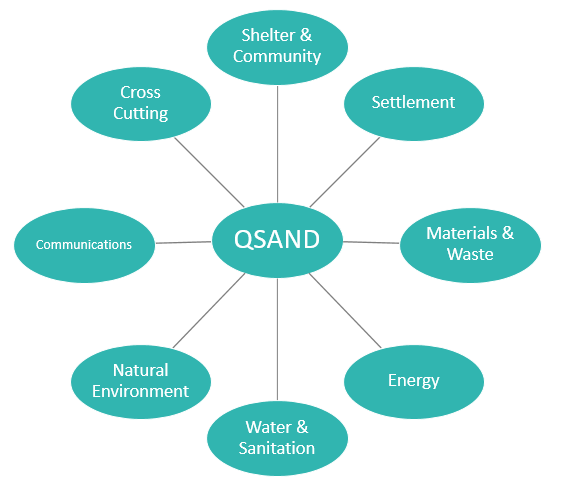QSAND

|
QSAND (Quantifying Sustainability in the Aftermath of Natural Disasters) is a free-to-use shelter and settlement sustainability and resilience self-assessment tool developed by BRE Global, on behalf of the IFRC (International Federation of Red Cross and Red Crescent Societies).
IFRC commissioned the development of QSAND to promote sustainable shelter and settlement activities following natural disasters. It draws on standards developed by BREEAM, the world-leading sustainability certification scheme for buildings, infrastructure and masterplanning.
QSAND was developed to support the drive in the humanitarian sector to consider and benchmark sustainable approaches to shelter and settlement operations after natural disasters. It takes a wide variety of factors into account and promotes a holistic, sustainable approach, and provides a co-ordinated framework for identifying and assessing the sustainability of solutions.
You can find out more at: http://www.qsand.org/
[edit] Related articles on Designing Buildings Wiki
- BRE articles.
- BREEAM.
- Building Research Establishment.
- Enhancing community energy resilience, QSAND and Loughborough University Research collaboration.
- Helping achieve the UN's Sustainable Development Goals.
- Helping communities recover from disasters and protecting them before they occur.
- How to rebuild using the debris from disasters.
- Managing and responding to disaster.
- QSAND and the Sustainable Development Goals.
- QSAND application in Nepal.
- Reconstruction following typhoon Haiyan.
Featured articles and news
Reform of the fire engineering profession
Fire Engineers Advisory Panel: Authoritative Statement, reactions and next steps.
Restoration and renewal of the Palace of Westminster
A complex project of cultural significance from full decant to EMI, opportunities and a potential a way forward.
Apprenticeships and the responsibility we share
Perspectives from the CIOB President as National Apprentice Week comes to a close.
The first line of defence against rain, wind and snow.
Building Safety recap January, 2026
What we missed at the end of last year, and at the start of this...
National Apprenticeship Week 2026, 9-15 Feb
Shining a light on the positive impacts for businesses, their apprentices and the wider economy alike.
Applications and benefits of acoustic flooring
From commercial to retail.
From solid to sprung and ribbed to raised.
Strengthening industry collaboration in Hong Kong
Hong Kong Institute of Construction and The Chartered Institute of Building sign Memorandum of Understanding.
A detailed description from the experts at Cornish Lime.
IHBC planning for growth with corporate plan development
Grow with the Institute by volunteering and CP25 consultation.
Connecting ambition and action for designers and specifiers.
Electrical skills gap deepens as apprenticeship starts fall despite surging demand says ECA.
Built environment bodies deepen joint action on EDI
B.E.Inclusive initiative agree next phase of joint equity, diversity and inclusion (EDI) action plan.
Recognising culture as key to sustainable economic growth
Creative UK Provocation paper: Culture as Growth Infrastructure.
Futurebuild and UK Construction Week London Unite
Creating the UK’s Built Environment Super Event and over 25 other key partnerships.
Welsh and Scottish 2026 elections
Manifestos for the built environment for upcoming same May day elections.
Advancing BIM education with a competency framework
“We don’t need people who can just draw in 3D. We need people who can think in data.”
























